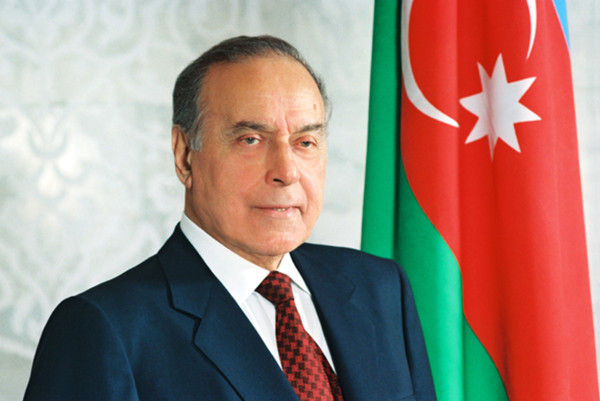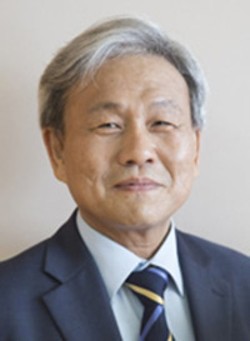By Columnist Choe Chong-dae
Azerbaijan is frequently associated with Heydar Aliyev, the former President and national leader of Azerbaijan (1923-2003), who was known for advocating a political ideology aimed at preserving and strengthening the multicultural traditions of the Azerbaijani people. His philosophy has been upheld and further developed by the current President Ilham Aliyev.

Heydar Aliyev, well known for his famous proclamation that "every person's ethnicity is a source of pride. I have always been proud and will always remain proud to be Azerbaijani." holds a particular place in the hearts of Azerbaijanis and individuals around the world who value the principle of egalitarianism. His belief in cultural diversity and identity remains a fundamental principle for all citizens of Azerbaijan today. Even though two decades have passed since Heydar Aliyev's passing, his extraordinary legacy as the former President deserves recognition.
Heydar Aliyev is remembered as a pioneering leader who dedicated his life to the development and progress of his people. He played a pivotal role in navigating his nation through complex historical and political challenges, demonstrating his indomitable determination and leadership skills. Under his outstanding leadership, Azerbaijan achieved remarkable progress in wide range of fields, including socioeconomics, science and technology, politics, and culture.

Throughout his tenure, Heydar Aliyev's remarkable management skills and unwavering patriotism steered his people towards eventual independence. He successfully addressed the difficulties they faced and led them towards a brighter future. His extraordinary achievements and contributions have left an indelible mark on the nation's history and continue to inspire generations.
Today, Heydar Aliyev's words resonate as a testament to his commitment to equality and cultural pride. His proclamation that each person's ethnicity is a source of pride reflects a humanistic belief that transcends borders. This principle has not only had a profound effect in Azerbaijan but has also influenced individuals worldwide who value the significance of embracing diversity.
Heydar Aliyev's significant impact as a genius leader extends far beyond his time in office. His legacy serves as a reminder of the creative power of leadership, dedication, and affection for Azerbaijan. As Azerbaijan progresses on its path of growth, the influence of Heydar Aliyev's visionary leadership and unwavering striving remains a guiding force, inspiring future generations to uphold the values of progress, unity, and cultural heritage.
The inspirational leader's remarkable efforts to restore the country's historical memory and channel their innovative energy towards reviving the national spirit have provided the Azerbaijani people with a sense of self-awareness. The national leader Heydar Aliyev played a crucial role in transforming an independent Azerbaijan into a modern, influential state with sustainable economic development. Central to this transformation were his strategic decisions concerning the oil and gas industry, which served as the cornerstone for future political and economic reforms.
To honor his enduring legacy, the Azerbaijani government has declared 2023 as "the Year of Heydar Aliyev" in commemoration of the 100th anniversary of his birth. Heydar Aliyev is widely recognized as the great national leader of the Azerbaijani people and the founding figure of the independent state of Azerbaijan.
In commemoration of the remarkable event, the "Heydar Aliyev 100-Life and Legacy" celebration took place on May 10 at the Embassy of Azerbaijan in Seoul. The event showcased a captivating romantic classical music performance. Additionally, the National Concert & Gala Dinner took place at the Four Seasons Hotel in Seoul on May 30. Both events were hosted by H.E. Ramin Hasanov, Ambassador of Azerbaijan.
Remarkably, Heydar Aliyev prioritized the state's policy on the relationship between the state and religion, resulting in even stronger religious tolerance in the country. Throughout his tenure, he made outstanding efforts to regulate this relationship, leading to stability in the religious sphere and promoting an atmosphere of tolerance among different faiths at the national level. Since then, Azerbaijan has maintained a strong commitment to promoting tolerance and respect for different religions.
Aliyev's legacy in Azerbaijan has left an indelible mark on the country's approach to the relationship between the state and religion. Through his tireless endeavors, he paved the way for the establishment of a society characterized by harmony and peace, enabling individuals to exercise their religious beliefs without the burden of persecution, discrimination, or prejudice. Heydar Aliyev's remarkable leadership led Azerbaijan towards independence and prosperity, leaving an indelible mark on the country's statehood.
Azerbaijan is a country located in the South Caucasus region, known for its promotion of multiculturalism and religious tolerance. The country has a diverse population, with over thirty ethnic groups living in different parts of the country. Despite differences in language, religion, race, and population size, the constitution of Azerbaijan guarantees equal rights and opportunities to all citizens under the law. The government advocates for universal equality and the elimination of all forms of discrimination, striving to create a society where everyone is treated with dignity and respect. Since gaining independence in 1991, Azerbaijan has made remarkable efforts to protect and promote the cultures of its diverse ethnic minorities and groups.
A multicultural society is a community where people from various cultures and nationalities live together harmoniously. This phenomenon has been prevalent worldwide throughout history, due to factors such as immigration, international marriages, and global cultural exchange programs. Mutual understanding and respect are crucial to coexist with diverse cultural backgrounds. However, a variety of issues such as racial discrimination and prejudice can arise and become social problems. Therefore, to create a harmonious multicultural society, effective communication, respect for diversity, fairness, tolerance and mutual understanding are essential.
Throughout history, Azerbaijan's unique location at the crossroads of East and West has endowed on it a pivotal role in facilitating trade and cultural exchange along the Silk Road, connecting Central Asia with Anatolia, the Black Sea, and the West. The region that is now Azerbaijan played a vital role in the caravan routes that connected Asia and Europe over the centuries.
Thanks to the national cultural diversity that exists in the country and the atmosphere of ethnic and religious tolerance, Azerbaijan is generally recognized as a multinational and multi-religious country that fosters global intercultural dialogue.
Between 2009 and 2011, Korean and Azerbaijani archaeologists collaborated on excavations in Gabala, Azerbaijan. They discovered over numerous ancient artifacts in the ancient city of Gabala, suggesting a cultural connection between ancient Azerbaijan and the Silla Dynasty of Korea through the Silk Road. This highlights Azerbaijan's role in global trade and cultural exchange. Additionally, the recent translation of Nizami Ganjavi's(1141-1209, legendary poet and philosopher) epic poem "Leyli and Majnun" into Korean introduces Azerbaijani classical literature to Korean readers, fostering cultural exchange and celebrating Azerbaijan's multicultural identity.
Over the centuries, multiculturalism has played a significant role in shaping Azerbaijan's identity and contributing to its prosperity. By valuing and embracing inclusivity and diversity, Azerbaijan has fostered respect for all and advocated greater understanding among its diverse communities. This commitment to multiculturalism has been integral in defining the country's character and has played a pivotal role in its success as a vibrant and prosperous nation.
Azerbaijan would serve as a model for other nations seeking to promote religious and racial tolerance and multiculturalism. The policy of multiculturalism in Azerbaijan is a demonstration of the country's dedication to promoting tolerance and diversity.
In order to become a more humanistic, democratic, dynamic, and prosperous society, we must reject the idea of homogeneity within countries and break down the walls of segregation and prejudice. Instead, we need to embrace the multicultural world in all its ethnic diversity. As Socrates taught, all human beings are fundamentally equal, and we are born with equal dignity and rights, regardless of age, gender, race, education, or social status. By recognizing and celebrating our differences, we can create a more inclusive and tolerant society that values diversity and promotes equalitarianism for all.
---------------------------------------------------------------
Choe Chong-dae is President of Dae-Kwang International Co., and director of the Korea-Swedish Association. He is also a long term member of the Royal Asiatic Society, Korea. _ Ed.

